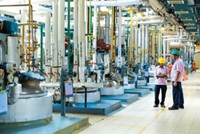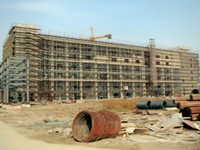Advertisement
Grab your lab coat. Let's get started
Welcome!
Welcome!
Create an account below to get 6 C&EN articles per month, receive newsletters and more - all free.
It seems this is your first time logging in online. Please enter the following information to continue.
As an ACS member you automatically get access to this site. All we need is few more details to create your reading experience.
Not you? Sign in with a different account.
Not you? Sign in with a different account.
ERROR 1
ERROR 1
ERROR 2
ERROR 2
ERROR 2
ERROR 2
ERROR 2
Password and Confirm password must match.
If you have an ACS member number, please enter it here so we can link this account to your membership. (optional)
ERROR 2
ACS values your privacy. By submitting your information, you are gaining access to C&EN and subscribing to our weekly newsletter. We use the information you provide to make your reading experience better, and we will never sell your data to third party members.
Business
Dr. Reddy's Gambit
Frequent drug industry nemesis seeks to boost its custom manufacturing business
by Jean-François Tremblay
January 30, 2006
| A version of this story appeared in
Volume 84, Issue 5

When India's Dr. Reddy's Laboratories spent $59 million to buy a Mexican pharmaceutical chemical plant from Roche last November, the Indian firm said the move was part of a strategy to expand its custom pharmaceutical chemical business 10-fold. To achieve the target, Dr. Reddy's will also have to convince customers to look past the fact that it is also their legal nemesis.
Dr. Reddy's is the Indian generic drug producer that most often challenges larger pharmaceutical companies' patents in U.S. courts to gain market access. In the past few years, Reddy's has gone after the patents of Pfizer, GlaxoSmithKline, Eli Lilly & Co., Novartis, and other companies.
Abhijit Mukherjee, a seasoned executive who previously worked at leading consumer goods company Hindustan Lever, is Reddy's president of developing businesses and the person in charge of building up the custom pharmaceutical chemical business. He acknowledges that some potential customers will have a problem turning to Reddy's for their pharmaceutical chemical needs. "But if you look at it rationally, rather than in an emotional way, you'll seriously consider us," he says. "We offer excellence of service."

Mukherjee explains that Reddy's is a sophisticated company. One of India's top pharmaceutical firms, it has a great deal of manufacturing strength; is ranked as the seventh best employer in India; and, partly because of its experience with legal challenges, has a deep understanding of drug regulations in the U.S. He adds that intellectual property is well-protected at Reddy's. "In the small world of custom pharmaceuticals, you violate your customer's IP only once. Your business is destroyed after that," he says.
Mukund S. Chorghade, a consultant who specializes in helping U.S. drug companies sourcing products and services from India, says it will be difficult for pharmaceutical companies to have anything other than an "emotional response" to Reddy's sales pitch. As a result, Chorghade anticipates that Reddy's will be relegated to supplying less complex pharmaceutical ingredients than are supplied by firms that do not challenge patents.
However, large drug companies are increasingly familiar with India, and this will work in Dr. Reddy's favor, Chorghade adds. "Five years ago, Pfizer did not outsource anything to India. Now, Pfizer is the leader in sourcing clinical trials and data management in India." He further notes that Wyeth recently signed a major chemistry outsourcing deal with GVK Bio (C&EN, Jan. 23, page 23).
Mukherjee says pharmaceutical custom manufacturing is a growth business. Large drug companies are outsourcing manufacturing to reduce costs and focus on other things that they consider their core activities. Reddy's launched its custom pharmaceutical chemical business about three years ago to take advantage of this trend. The acquisition of the Roche plant increased the firm's custom pharmaceutical sales manyfold, he says, adding that he cannot provide exact numbers as it might affect Dr. Reddy's stock price.
Reddy's paid a premium for the Roche plant, Mukherjee says, because the sale included the plant's customers. He explains that it's normally cheaper for a company to establish a customer base through its own efforts, but the Roche deal presented a compelling opportunity to achieve critical mass. Mukherjee adds that it's unlikely customers of the Mexican plant will now look for another supplier because it would be too time-consuming and costly.
Following this acquisition, Dr. Reddy's will now refocus its attention on "organic growth" by signing up new customers and earning their trust. Building trust takes time, Mukherjee says. For now, "the basis of the relationship is spelled out in the contract," he says. Most customers were initially small biotech firms, but increasingly, large pharmaceutical companies are signing up.
He expects that customers will eventually be delighted by the quality of service from Reddy's. In this regard, the company's knowledge of U.S. pharmaceutical regulations is a strong asset, Mukherjee says. "If our knowledge of pharmaceutical filing regulations in the U.S. can save customers eight months, should they really care that we acquired this know-how from our generics business?"




Join the conversation
Contact the reporter
Submit a Letter to the Editor for publication
Engage with us on Twitter